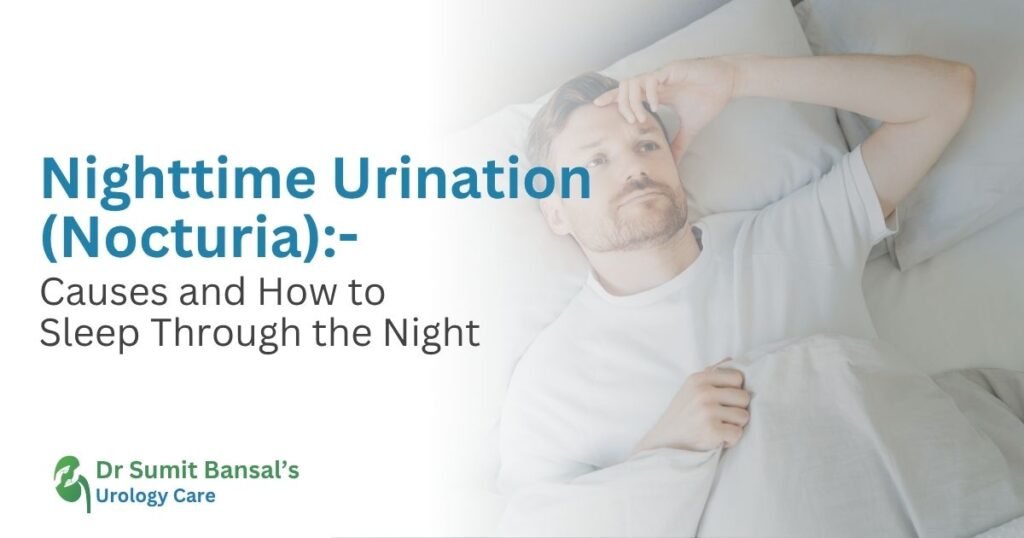Do you find yourself waking up multiple times at night to use the bathroom? You’re not alone. This condition, known as nocturia, affects millions of people and can significantly disrupt your sleep and daily life. While it might seem like a minor inconvenience, frequent nighttime urination can signal underlying health issues and lead to poor sleep quality, fatigue, and decreased productivity.
In this blog, we’ll explore what nocturia is, what causes it, and how you can manage or prevent it to enjoy uninterrupted, restful sleep.
What Is Nocturia?
Nocturia is the need to wake up more than once during the night to urinate. Unlike bedwetting (which is involuntary), nocturia involves waking up consciously to go to the bathroom. It’s more common in older adults, but it can affect people of any age depending on lifestyle and health factors.
Common Causes of Nocturia
1. Excessive Fluid Intake Before Bed
Drinking too much water, tea, coffee, or alcohol before bedtime can increase urine production at night.
2. Urinary Tract Infections (UTIs)
UTIs irritate the bladder, increasing the urge to urinate—even at night.
3. Bladder Conditions
Overactive bladder or bladder obstruction can lead to nocturia. These may be linked to conditions like benign prostatic hyperplasia (BPH) in men or pelvic floor dysfunction in women.
4. Diabetes and Blood Sugar Imbalance
Uncontrolled diabetes can cause excessive urination (polyuria), including at night.
5. Sleep Disorders
Conditions such as sleep apnea or insomnia can disrupt sleep, making individuals more aware of the urge to urinate.
6. Medications
Certain medications, such as diuretics or blood pressure pills, can increase nighttime urination if taken too late in the day.
7. Heart Conditions
Congestive heart failure may cause fluid to accumulate in the legs during the day, which is then reabsorbed and excreted at night when lying down.
When to See a Doctor
Waking up once at night may be normal, especially as we age. However, if you find yourself waking two or more times consistently, or if your sleep is significantly disturbed, it’s best to consult a doctor. Frequent nighttime urination can point to conditions like:
Enlarged prostate (BPH)
Diabetes
Kidney or bladder problems
Sleep disorders
Tips to Manage Nocturia and Sleep Better
🕒 Limit Fluid Intake in the Evening
Try to stop drinking fluids 2–3 hours before bedtime. Avoid caffeine and alcohol, which can irritate the bladder.
🍽️ Monitor Salt and Sugar Intake
A high salt or sugar diet can contribute to fluid retention and increased urination. Cut back, especially during dinner.
🧘 Practice Bladder Training
Gradually increase the time between urinations during the day to help the bladder hold more urine at night.
🛌 Elevate Your Legs During the Day
If fluid retention is an issue, elevate your legs during the day to reduce swelling and nighttime fluid reabsorption.
🏃 Stay Active
Regular exercise improves circulation and helps reduce fluid buildup.
💊 Adjust Medications
Consult your doctor to possibly reschedule diuretics or review any medication side effects.
Medical Treatments for Nocturia
If lifestyle changes don’t help, your doctor may recommend:
Medications to reduce bladder activity or nighttime urine production.
Treatment of underlying conditions like diabetes or sleep apnea.
Prostate treatments for men with BPH.
Final Thoughts
Nocturia can be frustrating, but it’s often manageable once the underlying cause is identified. If you’re struggling with frequent nighttime urination, don’t ignore it. Seek professional advice to rule out any serious conditions and get the sleep you deserve.
Need Expert Help?
If nocturia is affecting your quality of life, consult a urologist or healthcare provider today. Early diagnosis and personalized treatment can make a world of difference.


